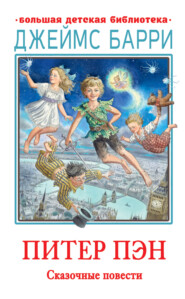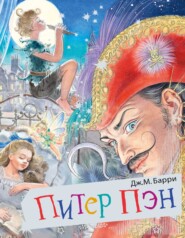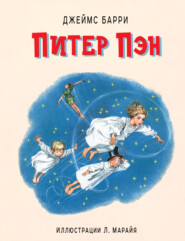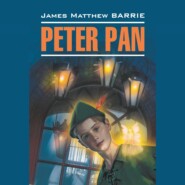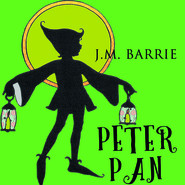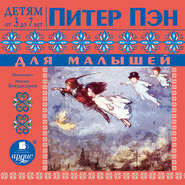По всем вопросам обращайтесь на: info@litportal.ru
(©) 2003-2025.
✖
The Little Minister
Настройки чтения
Размер шрифта
Высота строк
Поля
“‘I meant to send you some scrapes,’ he answered, ‘but it wasna till I changed ships that I had the chance, and then I minds, “Meggy kens I’m no hand with the pen.” But I swear I often thought of you, lass; and look you here, that’s better than letters, and so is this and every penny of it is yours.’
“He flung two bags of gold upon the table, and the chink brought you out from behind your mother.
“‘Hallo!’ Adam cried.
“‘He is mine,’ I said. ‘Gavin, come here.’ But Margaret held you back.
“‘Here’s a go,’ Adam muttered, and scratched his head. Then he slapped his thigh. ‘Gavin,’ he said, in his friendliest way, ‘we’ll toss for him.’
“He pulled the knife that is now in my desk from his pocket, spat on it, and flung it up. ‘Dry, the kid’s ours, Meggy,’ he explained; ‘wet, he goes to Gavin.’ I clinched my fist to – But what was the use? He caught the knife, and showed it to me.
“‘Dry,’ he said triumphantly; ‘so he is ours, Meggy. Kiddy, catch the knife. It is yours; and, mind, you have changed dads. And now that we have settled that, Gavin, there’s my hand again.’
“I went away and left them, and I never saw Margaret again until the day you brought her to Thrums. But I saw you once, a few days after Adam came back. I was in the school-house, packing my books, and you were playing on the waste ground. I asked you how your mother was, and you said, ‘She’s fleid to come to the door till you gang awa, and my father’s buying a boat.’
“‘I’m your father,’ I said; but you answered confidently:
“‘You’re no a living man. You’re just a man I dreamed about; and I promised my mother no to dream about you again.’
“‘I am your father,’ I repeated.
“‘My father’s awa buying a fishing-boat,’ you insisted; ‘and when I speir at my mother whaur my first father is, she says I’m havering.’
“‘Gavin Ogilvy is your name,’ I said. ‘No,’ you answered, ‘I have a new name. My mother telled me my name is aye to be Gavin Dishart now. She telled me, too, to fling awa this knife my father gave me, and I’ve flung it awa a lot o’ times, but I aye pick it up again.’
“‘Give it to me,’ I said, with the wicked thoughts of a fool in my head.
“That is how your knife came into my possession. I left Harvie that night in the carrier’s cart, but I had not the heart to return to college. Accident brought me here, and I thought it a fitting place in which to bury myself from Margaret.”
Chapter Thirty-Seven.
SECOND JOURNEY OF THE DOMINIE TO THRUMS DURING THE TWENTY-FOUR HOURS
Here was a nauseous draught for me. Having finished my tale, I turned to Gavin for sympathy; and, behold, he had been listening for the cannon instead of to my final words. So, like an old woman at her hearth, we warm our hands at our sorrows and drop in faggots, and each thinks his own fire a sun, in presence of which all other fires should go out. I was soured to see Gavin prove this, and then I could have laughed without mirth, for had not my bitterness proved it too?
“And now,” I said, rising, “whether Margaret is to hold up her head henceforth lies no longer with me, but with you.”
It was not to that he replied.
“You have suffered long, Mr. Ogilvy,” he said. “Father,” he added, wringing my hand. I called him son; but it was only an exchange of musty words that we had found too late. A father is a poor estate to come into at two and twenty.
“I should have been told of this,” he said.
“Your mother did right, sir,” I answered slowly, but he shook his head.
“I think you have misjudged her,” he said. “Doubtless while my fa – , while Adam Dishart lived, she could only think of you with pain; but after his death – ”
“After his death,” I said quietly, “I was still so horrible to her that she left Harvie without letting a soul 309 know whither she was bound. She dreaded my following her.”
“Stranger to me,” he said, after a pause, “than even your story is her being able to keep it from me. I believed no thought ever crossed her mind that she did not let me share.”
“And none, I am sure, ever did,” I answered, “save that, and such thoughts as a woman has with God only. It was my lot to bring disgrace on her. She thought it nothing less, and she has hidden it all these years for your sake, until now it is not burdensome. I suppose she feels that God has taken the weight off her. Now you are to put a heavier burden in its place.”
He faced me boldly, and I admire him for it now.
“I cannot admit,” he said, “that I did wrong in forgetting my mother for that fateful quarter of an hour. Babbie and I loved each other, and I was given the opportunity of making her mine or losing her forever. Have you forgotten that all this tragedy you have told me of only grew out of your own indecision? I took the chance that you let slip by.”
“I had not forgotten,” I replied. “What else made me tell you last night that Babbie was in Nanny’s house?”
“But now you are afraid – now when the deed is done, when for me there can be no turning back. Whatever be the issue, I should be a cur to return to Thrums without my wife. Every minute I feel my strength returning, and before you reach Thrums I will have set out to the Spittal.”
There was nothing to say after that. He came with me in the rain as far as the dike, warning me against telling his people what was not true.
“My first part,” I answered, “will be to send word to your mother that you are in safety. After that I must see Whamond. Much depends on him.”
“You will not go to my mother?”
“Not so long as she has a roof over her head,” I said, “but that may not be for long.”
So, I think, we parted – each soon to forget the other in a woman.
But I had not gone far when I heard something that stopped me as sharply as if it had been McKenzie’s hand once more on my shoulder. For a second the noise appalled me, and then, before the echo began, I knew it must be the Spittal cannon. My only thought was one of thankfulness. Now Gavin must see the wisdom of my reasoning. I would wait for him until he was able to come with me to Thrums. I turned back, and in my haste I ran through water I had gone round before.
I was too late. He was gone, and into the rain I shouted his name in vain. That he had started for the Spittal there could be no doubt; that he would ever reach it was less certain. The earl’s collie was still crouching by the fire, and, thinking it might be a guide to him, I drove the brute to the door, and chased it in the direction he probably had taken. Not until it had run from me did I resume my own journey. I do not need to be told that you who read would follow Gavin now rather than me; but you must bear with the dominie for a little while yet, as I see no other way of making things clear.
In some ways I was not ill-equipped for my attempt. I do not know any one of our hillsides as it is known to the shepherd, to whom every rabbit-hole and glimmer of mica is a landmark; but he, like his flock, has only to cross a dike to find himself in a strange land, while I have been everywhere in the glen.
In the foreground the rain slanted, transparent till it reached the ground, where a mist seemed to blow it along as wind ruffles grass. In the distance all was a driving mist. I have been out for perhaps an hour in rains as wetting, and I have watched floods from my window, but never since have I known the fifth part of 311 a season’s rainfall in eighteen hours; and if there should be the like here again, we shall be found better prepared for it. Men have been lost in the glen in mists so thick that they could plunge their fingers out of sight in it as into a meal girnel; but this mist never came within twenty yards of me. I was surrounded by it, however, as if I was in a round tent; and out of this tent I could not walk, for it advanced with me. On the other side of this screen were horrible noises, at whose cause I could only guess, save now and again when a tongue of water was shot at my feet, or great stones came crashing through the canvas of mist. Then I ran wherever safety prompted, and thus tangled my bearings until I was like that one in the child’s game who is blindfolded and turned round three times that he may not know east from west.
Once I stumbled over a dead sheep and a living lamb; and in a clump of trees which puzzled me – for they were where I thought no trees should be – a wood-pigeon flew to me, but struck my breast with such force that I picked it up dead. I saw no other living thing, though half a dozen times I must have passed within cry of farmhouses. At one time I was in a cornfield, where I had to lift my hands to keep them out of water, and a dread filled me that I had wandered in a circle, and was still on Waster Lunny’s land. I plucked some corn and held it to my eyes to see if it was green; but it was yellow, and so I knew that at last I was out of the glen.
People up here will complain if I do not tell how I found the farmer of Green Brae’s fifty pounds. It is one of the best-remembered incidents of the flood, and happened shortly after I got out of the cornfield. A house rose suddenly before me, and I was hastening to it when as suddenly three of its walls fell. Before my mind could give a meaning to what my eyes told it, the water that had brought down the house had lifted me off my feet and flung me among waves. That would 312 have been the last of the dominie had I not struck against a chest, then halfway on its voyage to the sea. I think the lid gave way under me; but that is surmise, for from the time the house fell till I was on the river in a kist that was like to be my coffin, is almost a blank. After what may have been but a short journey, though I had time in it to say my prayers twice, we stopped, jammed among fallen trees; and seeing a bank within reach, I tried to creep up it. In this there would have been little difficulty had not the contents of the kist caught in my feet and held on to them, like living things afraid of being left behind. I let down my hands to disentangle my feet, but failed; and then, grown desperate, I succeeded in reaching firm ground, dragging I knew not what after me. It proved to be a pillow-slip. Green Brae still shudders when I tell him that my first impulse was to leave the pillow-slip unopened. However, I ripped it up, for to undo the wet strings that had ravelled round my feet would have wearied even a man with a needle to pick open the knots; and among broken gimlets, the head of a grape, and other things no beggar would have stolen, I found a tin canister containing fifty pounds. Waster Lunny says that this should have made a religious man of Green Brae, and it did to this extent, that he called the fall of the cotter’s house providential. Otherwise the cotter, at whose expense it may be said the money was found, remains the more religious man of the two.
At last I came to the Kelpie’s brig, and I could have wept in joy (and might have been better employed), when, like everything I saw on that journey, it broke suddenly through the mist, and seemed to run at me like a living monster. Next moment I ran back, for as I stepped upon the bridge I saw that I had been about to walk into the air. What was left of the Kelpie’s brig ended in mid-stream. Instead of thanking God for the light without which I should have gone abruptly to my death, I sat down miserable and hopeless.
Presently I was up and trudging to the Loups of Malcolm. At the Loups the river runs narrow and deep between cliffs, and the spot is so called because one Malcolm jumped across it when pursued by wolves. Next day he returned boastfully to look at his jump, and gazing at it turned dizzy and fell into the river. Since that time chains have been hung across the Loups to reduce the distance between the farms of Carwhimple and Keep-What-You-Can from a mile to a hundred yards. You must cross the chains on your breast. They were suspended there by Rob Angus, who was also the first to breast them.
But I never was a Rob Angus. When my pupils practise what they call the high jump, two small boys hold a string aloft, and the bigger ones run at it gallantly until they reach it, when they stop meekly and creep beneath. They will repeat this twenty times, and yet never, when they start for the string, seem to know where their courage will fail. Nay, they will even order the small boys to hold the string higher. I have smiled at this, but it was the same courage while the difficulty is far off that took me to the Loups. At sight of them I turned away.
I prayed to God for a little of the mettle of other men, and He heard me, for with my eyes shut I seemed to see Margaret beckoning from across the abyss as if she had need of me. Then I rose calmly and tested the chains, and crossed them on my breast. Many have done it with the same danger, at which they laugh, but without that vision I should have held back.
I was now across the river, and so had left the chance of drowning behind, but I was farther from Thrums than when I left the school-house, and this countryside was almost unknown to me. The mist had begun to clear, so that I no longer wandered into fields; but though I kept to the roads, I could not tell that they led toward Thrums, and in my exhaustion I had often to stand still. Then to make a new start in the mud 314 was like pulling stakes out of the ground. So long as the rain faced me I thought I could not be straying far; but after an hour I lost this guide, for a wind rose that blew it in all directions.
In another hour, when I should have been drawing near Thrums, I found myself in a wood, and here I think my distress was greatest; nor is this to be marvelled at, for instead of being near Thrums, I was listening to the monotonous roar of the sea. I was too spent to reason, but I knew that I must have travelled direct east, and must be close to the German Ocean. I remember putting my back against a tree and shutting my eyes, and listening to the lash of the waves against the beach, and hearing the faint toll of a bell, and wondering listlessly on what lighthouse it was ringing. Doubtless I would have lain down to sleep forever had I not heard another sound near at hand. It was the knock of a hammer on wood, and might have been a fisherman mending his boat. The instinct of self-preservation carried me to it, and presently I was at a little house. A man was standing in the rain, hammering new hinges to the door; and though I did not recognize him, I saw with bewilderment that the woman at his side was Nanny.
“It’s the dominie,” she cried, and her brother added:
“Losh, sir, you hinna the look o’ a living man.”
“He flung two bags of gold upon the table, and the chink brought you out from behind your mother.
“‘Hallo!’ Adam cried.
“‘He is mine,’ I said. ‘Gavin, come here.’ But Margaret held you back.
“‘Here’s a go,’ Adam muttered, and scratched his head. Then he slapped his thigh. ‘Gavin,’ he said, in his friendliest way, ‘we’ll toss for him.’
“He pulled the knife that is now in my desk from his pocket, spat on it, and flung it up. ‘Dry, the kid’s ours, Meggy,’ he explained; ‘wet, he goes to Gavin.’ I clinched my fist to – But what was the use? He caught the knife, and showed it to me.
“‘Dry,’ he said triumphantly; ‘so he is ours, Meggy. Kiddy, catch the knife. It is yours; and, mind, you have changed dads. And now that we have settled that, Gavin, there’s my hand again.’
“I went away and left them, and I never saw Margaret again until the day you brought her to Thrums. But I saw you once, a few days after Adam came back. I was in the school-house, packing my books, and you were playing on the waste ground. I asked you how your mother was, and you said, ‘She’s fleid to come to the door till you gang awa, and my father’s buying a boat.’
“‘I’m your father,’ I said; but you answered confidently:
“‘You’re no a living man. You’re just a man I dreamed about; and I promised my mother no to dream about you again.’
“‘I am your father,’ I repeated.
“‘My father’s awa buying a fishing-boat,’ you insisted; ‘and when I speir at my mother whaur my first father is, she says I’m havering.’
“‘Gavin Ogilvy is your name,’ I said. ‘No,’ you answered, ‘I have a new name. My mother telled me my name is aye to be Gavin Dishart now. She telled me, too, to fling awa this knife my father gave me, and I’ve flung it awa a lot o’ times, but I aye pick it up again.’
“‘Give it to me,’ I said, with the wicked thoughts of a fool in my head.
“That is how your knife came into my possession. I left Harvie that night in the carrier’s cart, but I had not the heart to return to college. Accident brought me here, and I thought it a fitting place in which to bury myself from Margaret.”
Chapter Thirty-Seven.
SECOND JOURNEY OF THE DOMINIE TO THRUMS DURING THE TWENTY-FOUR HOURS
Here was a nauseous draught for me. Having finished my tale, I turned to Gavin for sympathy; and, behold, he had been listening for the cannon instead of to my final words. So, like an old woman at her hearth, we warm our hands at our sorrows and drop in faggots, and each thinks his own fire a sun, in presence of which all other fires should go out. I was soured to see Gavin prove this, and then I could have laughed without mirth, for had not my bitterness proved it too?
“And now,” I said, rising, “whether Margaret is to hold up her head henceforth lies no longer with me, but with you.”
It was not to that he replied.
“You have suffered long, Mr. Ogilvy,” he said. “Father,” he added, wringing my hand. I called him son; but it was only an exchange of musty words that we had found too late. A father is a poor estate to come into at two and twenty.
“I should have been told of this,” he said.
“Your mother did right, sir,” I answered slowly, but he shook his head.
“I think you have misjudged her,” he said. “Doubtless while my fa – , while Adam Dishart lived, she could only think of you with pain; but after his death – ”
“After his death,” I said quietly, “I was still so horrible to her that she left Harvie without letting a soul 309 know whither she was bound. She dreaded my following her.”
“Stranger to me,” he said, after a pause, “than even your story is her being able to keep it from me. I believed no thought ever crossed her mind that she did not let me share.”
“And none, I am sure, ever did,” I answered, “save that, and such thoughts as a woman has with God only. It was my lot to bring disgrace on her. She thought it nothing less, and she has hidden it all these years for your sake, until now it is not burdensome. I suppose she feels that God has taken the weight off her. Now you are to put a heavier burden in its place.”
He faced me boldly, and I admire him for it now.
“I cannot admit,” he said, “that I did wrong in forgetting my mother for that fateful quarter of an hour. Babbie and I loved each other, and I was given the opportunity of making her mine or losing her forever. Have you forgotten that all this tragedy you have told me of only grew out of your own indecision? I took the chance that you let slip by.”
“I had not forgotten,” I replied. “What else made me tell you last night that Babbie was in Nanny’s house?”
“But now you are afraid – now when the deed is done, when for me there can be no turning back. Whatever be the issue, I should be a cur to return to Thrums without my wife. Every minute I feel my strength returning, and before you reach Thrums I will have set out to the Spittal.”
There was nothing to say after that. He came with me in the rain as far as the dike, warning me against telling his people what was not true.
“My first part,” I answered, “will be to send word to your mother that you are in safety. After that I must see Whamond. Much depends on him.”
“You will not go to my mother?”
“Not so long as she has a roof over her head,” I said, “but that may not be for long.”
So, I think, we parted – each soon to forget the other in a woman.
But I had not gone far when I heard something that stopped me as sharply as if it had been McKenzie’s hand once more on my shoulder. For a second the noise appalled me, and then, before the echo began, I knew it must be the Spittal cannon. My only thought was one of thankfulness. Now Gavin must see the wisdom of my reasoning. I would wait for him until he was able to come with me to Thrums. I turned back, and in my haste I ran through water I had gone round before.
I was too late. He was gone, and into the rain I shouted his name in vain. That he had started for the Spittal there could be no doubt; that he would ever reach it was less certain. The earl’s collie was still crouching by the fire, and, thinking it might be a guide to him, I drove the brute to the door, and chased it in the direction he probably had taken. Not until it had run from me did I resume my own journey. I do not need to be told that you who read would follow Gavin now rather than me; but you must bear with the dominie for a little while yet, as I see no other way of making things clear.
In some ways I was not ill-equipped for my attempt. I do not know any one of our hillsides as it is known to the shepherd, to whom every rabbit-hole and glimmer of mica is a landmark; but he, like his flock, has only to cross a dike to find himself in a strange land, while I have been everywhere in the glen.
In the foreground the rain slanted, transparent till it reached the ground, where a mist seemed to blow it along as wind ruffles grass. In the distance all was a driving mist. I have been out for perhaps an hour in rains as wetting, and I have watched floods from my window, but never since have I known the fifth part of 311 a season’s rainfall in eighteen hours; and if there should be the like here again, we shall be found better prepared for it. Men have been lost in the glen in mists so thick that they could plunge their fingers out of sight in it as into a meal girnel; but this mist never came within twenty yards of me. I was surrounded by it, however, as if I was in a round tent; and out of this tent I could not walk, for it advanced with me. On the other side of this screen were horrible noises, at whose cause I could only guess, save now and again when a tongue of water was shot at my feet, or great stones came crashing through the canvas of mist. Then I ran wherever safety prompted, and thus tangled my bearings until I was like that one in the child’s game who is blindfolded and turned round three times that he may not know east from west.
Once I stumbled over a dead sheep and a living lamb; and in a clump of trees which puzzled me – for they were where I thought no trees should be – a wood-pigeon flew to me, but struck my breast with such force that I picked it up dead. I saw no other living thing, though half a dozen times I must have passed within cry of farmhouses. At one time I was in a cornfield, where I had to lift my hands to keep them out of water, and a dread filled me that I had wandered in a circle, and was still on Waster Lunny’s land. I plucked some corn and held it to my eyes to see if it was green; but it was yellow, and so I knew that at last I was out of the glen.
People up here will complain if I do not tell how I found the farmer of Green Brae’s fifty pounds. It is one of the best-remembered incidents of the flood, and happened shortly after I got out of the cornfield. A house rose suddenly before me, and I was hastening to it when as suddenly three of its walls fell. Before my mind could give a meaning to what my eyes told it, the water that had brought down the house had lifted me off my feet and flung me among waves. That would 312 have been the last of the dominie had I not struck against a chest, then halfway on its voyage to the sea. I think the lid gave way under me; but that is surmise, for from the time the house fell till I was on the river in a kist that was like to be my coffin, is almost a blank. After what may have been but a short journey, though I had time in it to say my prayers twice, we stopped, jammed among fallen trees; and seeing a bank within reach, I tried to creep up it. In this there would have been little difficulty had not the contents of the kist caught in my feet and held on to them, like living things afraid of being left behind. I let down my hands to disentangle my feet, but failed; and then, grown desperate, I succeeded in reaching firm ground, dragging I knew not what after me. It proved to be a pillow-slip. Green Brae still shudders when I tell him that my first impulse was to leave the pillow-slip unopened. However, I ripped it up, for to undo the wet strings that had ravelled round my feet would have wearied even a man with a needle to pick open the knots; and among broken gimlets, the head of a grape, and other things no beggar would have stolen, I found a tin canister containing fifty pounds. Waster Lunny says that this should have made a religious man of Green Brae, and it did to this extent, that he called the fall of the cotter’s house providential. Otherwise the cotter, at whose expense it may be said the money was found, remains the more religious man of the two.
At last I came to the Kelpie’s brig, and I could have wept in joy (and might have been better employed), when, like everything I saw on that journey, it broke suddenly through the mist, and seemed to run at me like a living monster. Next moment I ran back, for as I stepped upon the bridge I saw that I had been about to walk into the air. What was left of the Kelpie’s brig ended in mid-stream. Instead of thanking God for the light without which I should have gone abruptly to my death, I sat down miserable and hopeless.
Presently I was up and trudging to the Loups of Malcolm. At the Loups the river runs narrow and deep between cliffs, and the spot is so called because one Malcolm jumped across it when pursued by wolves. Next day he returned boastfully to look at his jump, and gazing at it turned dizzy and fell into the river. Since that time chains have been hung across the Loups to reduce the distance between the farms of Carwhimple and Keep-What-You-Can from a mile to a hundred yards. You must cross the chains on your breast. They were suspended there by Rob Angus, who was also the first to breast them.
But I never was a Rob Angus. When my pupils practise what they call the high jump, two small boys hold a string aloft, and the bigger ones run at it gallantly until they reach it, when they stop meekly and creep beneath. They will repeat this twenty times, and yet never, when they start for the string, seem to know where their courage will fail. Nay, they will even order the small boys to hold the string higher. I have smiled at this, but it was the same courage while the difficulty is far off that took me to the Loups. At sight of them I turned away.
I prayed to God for a little of the mettle of other men, and He heard me, for with my eyes shut I seemed to see Margaret beckoning from across the abyss as if she had need of me. Then I rose calmly and tested the chains, and crossed them on my breast. Many have done it with the same danger, at which they laugh, but without that vision I should have held back.
I was now across the river, and so had left the chance of drowning behind, but I was farther from Thrums than when I left the school-house, and this countryside was almost unknown to me. The mist had begun to clear, so that I no longer wandered into fields; but though I kept to the roads, I could not tell that they led toward Thrums, and in my exhaustion I had often to stand still. Then to make a new start in the mud 314 was like pulling stakes out of the ground. So long as the rain faced me I thought I could not be straying far; but after an hour I lost this guide, for a wind rose that blew it in all directions.
In another hour, when I should have been drawing near Thrums, I found myself in a wood, and here I think my distress was greatest; nor is this to be marvelled at, for instead of being near Thrums, I was listening to the monotonous roar of the sea. I was too spent to reason, but I knew that I must have travelled direct east, and must be close to the German Ocean. I remember putting my back against a tree and shutting my eyes, and listening to the lash of the waves against the beach, and hearing the faint toll of a bell, and wondering listlessly on what lighthouse it was ringing. Doubtless I would have lain down to sleep forever had I not heard another sound near at hand. It was the knock of a hammer on wood, and might have been a fisherman mending his boat. The instinct of self-preservation carried me to it, and presently I was at a little house. A man was standing in the rain, hammering new hinges to the door; and though I did not recognize him, I saw with bewilderment that the woman at his side was Nanny.
“It’s the dominie,” she cried, and her brother added:
“Losh, sir, you hinna the look o’ a living man.”









